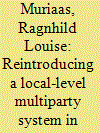| Srl | Item |
| 1 |
ID:
120910


|
|
|
|
|
| Publication |
2012.
|
| Summary/Abstract |
In February 2011, Ugandan President Yoweri Museveni resoundingly won re-election. In the aftermath of the vote, which many had predicted would be competitive, analysts and opposition supporters ascribed Museveni's victory to massive pre-election spending on public goods, creation of new administrative districts, and vote buying. While the opposition could not compete with Museveni and his National Resistance Movement in access to resources, our analyses of survey data, from two pre-election surveys conducted by Afrobarometer in November/December 2010 and January 2011, and a pre- and post-election panel study, find little evidence that Museveni benefited significantly from public goods outlays, district creation, and vote buying. Additionally, we find little evidence that fear and intimidation were responsible for the results. Instead, the data suggest that Museveni's re-election was driven by an uninspiring opposition slate, widespread satisfaction with macro-economic growth, and an improved security situation, particularly in the Northern Region.
|
|
|
|
|
|
|
|
|
|
|
|
|
|
|
|
| 2 |
ID:
178093


|
|
|
|
|
| Summary/Abstract |
Institutional explanations of intra-party violence rarely address political economy dynamics shaping the institutions in question, and therefore they fail to understand their emergence and their stability. Specifically, focusing on institutional factors alone does not enable a nuanced understanding of candidate nomination violence and why some constituencies are peaceful while others are violent. This article theorizes nomination violence in dominant-party systems in sub-Saharan Africa. Drawing on political settlement theory, it examines the nature of nomination violence in Uganda’s October 2015 National Resistance Movement (NRM) primaries. We argue that the violence is a constitutive part of Uganda’s political settlement under the NRM. Nomination procedures remain weak in order for the NRM ruling elite to include multiple factions that compete for access while being able to intervene in the election process when needed. This means, in turn, that violence tends to become particularly prominent in constituencies characterized by proxy wars, where competition between local candidates is reinforced by a conflict among central-level elites in the president’s inner circle. We call for the proxy war thesis to be tested in case studies of other dominant parties’ nomination processes.
|
|
|
|
|
|
|
|
|
|
|
|
|
|
|
|
| 3 |
ID:
086986


|
|
|
|
|
| Publication |
2009.
|
| Summary/Abstract |
This Article analyses the dynamics beteen the incumbent movement and the emerging opposition in local communities in Uganda in the months following the referendum in July 2005, in a multiparty system in Uganda.
|
|
|
|
|
|
|
|
|
|
|
|
|
|
|
|